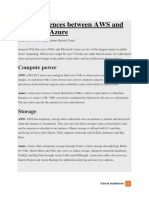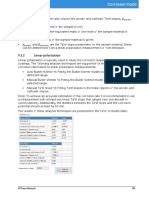Operating System Lab Syllabus[1]
Uploaded by
vanadita sharmaOperating System Lab Syllabus[1]
Uploaded by
vanadita sharmaOPERATING SYSTEMS LAB
Course Code: 23CS2114 Continuous Evaluation: 60 Marks
Pre-Requisite : NIL End Semester Examination: 40 Marks
LT P:0 02
Credits: 1
COURSE OBJECTIVES
1. To understand the operating system principles and its implementations.
2. To understand the main components of an OS & their functions.
3. To provide necessary skills for developing and debugging programs in order to optimize
performance of OS.
4. To study the process management and scheduling.
COURSE LEARNING OUTCOMES (CLO)
The syllabus has been prepared in accordance with National Education Policy (NEP). After completion of
course, students would be able to:
1. Demonstrate the various operations of file system.
2. Understand and Implement Memory management schemes, Thread and synchronization
3. Implement Deadlock algorithms and page replacement algorithms.
4. Apply the process synchronous concept using message queue, shared memory, semaphore for given
situation.
5. Implement Scheduling algorithms.
COURSE LEARNING OUTCOMES (CLO)-COURSE OBJECTIVES (CO) MAPPING
CLO1 CLO2 CLO3 CLO4 CLO5
CO1
CO2
CO3
CO4
LIST OF PROGRAMS
1. Write a program to implement CPU scheduling for first come first serve.
2. Write a program to implement CPU scheduling for shortest job first.
3. Write a program to perform priority scheduling.
4. Write a program to implement CPU scheduling for Round Robin.
5. Write a program for page replacement policy using a LRU
6. Write a program for page replacement policy using FIFO.
7. Write a program for page replacement policy using Optimal.
98
8. Write a program to implement first fit, best fit and worst fit algorithm for Memory management.
9. Write a program to implement reader/writer problem using semaphore.
10. Write a program to implement Banker’s algorithm for deadlock avoidance.
TEXT BOOKS
1. Abraham Silberschatz Peter B. Galvin and Greg Gagne, Operating System Concepts, Wiley 8th
Edition, 2008.
2. Garry. J. Nutt, Operating Systems: A Modern Perspective, Addison-Wesley
3. Andrew S. Tanenbaum and Herbert Bros, Modern Operating Systems (4th Edition), Pearson
REFERENCE BOOKS
1. William Stallings, “Operating Systems – internals and design principles”, Prentice Hall India, 5 th
Edition, 2005.
99
You might also like
- Operating System Laboratory - Lab ManualNo ratings yetOperating System Laboratory - Lab Manual22 pages
- HTTP - App - Utu.ac - in - Utuexmanagement - Exammsters - Syllabus - CE2010-Operating System1No ratings yetHTTP - App - Utu.ac - in - Utuexmanagement - Exammsters - Syllabus - CE2010-Operating System14 pages
- Ita3008 Operating-Systems Eth 1.0 37 Ita3008No ratings yetIta3008 Operating-Systems Eth 1.0 37 Ita30082 pages
- ComputerOrganizationAndSoftwareSystems Flipped HONo ratings yetComputerOrganizationAndSoftwareSystems Flipped HO10 pages
- Ite2002 Operating-Systems Eth 1.0 37 Ite2002No ratings yetIte2002 Operating-Systems Eth 1.0 37 Ite20027 pages
- Cse2005 Operating-Systems Eth 1.0 37 Cse2005No ratings yetCse2005 Operating-Systems Eth 1.0 37 Cse20052 pages
- Processor Management: Instructor's Manual Table of ContentsNo ratings yetProcessor Management: Instructor's Manual Table of Contents11 pages
- OS Lab Manual 0704CS191002 Abhijeet ShastriNo ratings yetOS Lab Manual 0704CS191002 Abhijeet Shastri44 pages
- Session 3220: ?$HX ) 1996 Annual Conference Proceedings .J M&L#No ratings yetSession 3220: ?$HX ) 1996 Annual Conference Proceedings .J M&L#6 pages
- 10) WASE 2018 - Comp - Org - Archi - Flipped - HONo ratings yet10) WASE 2018 - Comp - Org - Archi - Flipped - HO14 pages
- Week 1 Lecture - Evolution of Programming LanguageNo ratings yetWeek 1 Lecture - Evolution of Programming Language15 pages
- How to Pass Operating System 4 Semester Engineering in One DayNo ratings yetHow to Pass Operating System 4 Semester Engineering in One Day20 pages
- Python Automation for Beginners: A Practical Guide with ExamplesFrom EverandPython Automation for Beginners: A Practical Guide with ExamplesNo ratings yet
- Temporal Data Types Specific data types that capture time-related information. Timestamps Mechanisms to record the time at which data is valid or stored. Examples Customer records with history, emNo ratings yetTemporal Data Types Specific data types that capture time-related information. Timestamps Mechanisms to record the time at which data is valid or stored. Examples Customer records with history, em10 pages
- Purchase Order: Contract Creation: Step 1: Go To Transaction CodeNo ratings yetPurchase Order: Contract Creation: Step 1: Go To Transaction Code18 pages
- A Voltmeter Gives 120 Oscillations Per Minute When Connected To The Rotor of An Induction Motor. The Frequency Is 50 Hz. What Is The Slip of The Motor - QuoraNo ratings yetA Voltmeter Gives 120 Oscillations Per Minute When Connected To The Rotor of An Induction Motor. The Frequency Is 50 Hz. What Is The Slip of The Motor - Quora5 pages
- 9. Thiết Kế Đồ Án Công Nghệ Chế Tạo MáyNo ratings yet9. Thiết Kế Đồ Án Công Nghệ Chế Tạo Máy190 pages
- Assignment 3: Submitted by Muneeb Shahid Roll No 19011598-138 Section SE-4C Submitted To MR Shahzaib AbbasNo ratings yetAssignment 3: Submitted by Muneeb Shahid Roll No 19011598-138 Section SE-4C Submitted To MR Shahzaib Abbas8 pages
- HP Pro SFF 400 G9 Desktop PC: Versatile To Meet Your Ever-Changing Business NeedsNo ratings yetHP Pro SFF 400 G9 Desktop PC: Versatile To Meet Your Ever-Changing Business Needs5 pages
- Chapter 1 Introduction To Information TechnologyNo ratings yetChapter 1 Introduction To Information Technology5 pages
- IoT Based Weather Soil Sensor Station For Precision AgricultureNo ratings yetIoT Based Weather Soil Sensor Station For Precision Agriculture6 pages
- Keywords: Blood Bank, Android, Database, Donors, Acceptors, Administrator100% (1)Keywords: Blood Bank, Android, Database, Donors, Acceptors, Administrator12 pages
- Lean-Six Sigma Project Charter Worksheet: Preliminary Plan Actual Date Target Date StatusNo ratings yetLean-Six Sigma Project Charter Worksheet: Preliminary Plan Actual Date Target Date Status4 pages





























































































